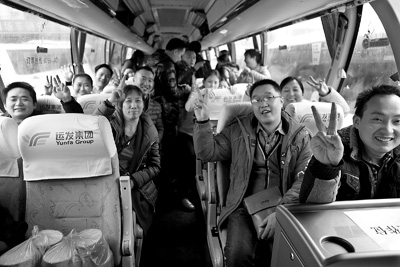
Han Ximin
ximhan@126.com
THE temporary train, K4076, left Shenzhen Railway Station in Luohu District for Chengdu, capital of Sichuan Province, early Friday morning, marking the start of the 40-day Spring Festival transport season. It carried 1,600 passengers.
After two days of the travel rush, by 6 p.m. Saturday, 714,600 passengers had left the city. Among them, 410,400 traveled by railway service, an increase of 7.59 percent over the same period of the previous year, Shenzhen Spring Festival transport office said.
For the first time, Shenzhen Railway Station introduced facial-recognition systems at four of the 12 ticket check-in entrances to the waiting hall. The system automatically compares a passenger’s face with the photo on his or her ID card and allows the passenger to enter the station after a match. Along with Shenzhen East Railway Station, the two stations have a total of 95 ticket dispensers, where travelers can collect and buy tickets.
The stations will operate 22 pairs of temporary trains including 15 pairs mainly to Sichuan, Hubei, Hunan, Anhui and Henan, which are the provinces that make up most of the city’s massive population of migrant workers.
For the holiday rush, Shenzhen Railway Station set up temporary shelters linking Exit C of Luohu Station on the Metro’s Luobao Line and the entrance to the waiting hall of the train station.
The shelters, which cover about 8,500 square meters, will enable around 6,000 passengers to wait for their trains without being exposed to the cold.
During the 15-day pre-festival period, Shenzhen Railway Station and Shenzhen East Railway Station are expected to see 1.75 million passengers, with the peak of the pre-holiday rush coming between Jan. 21-27.
Between Jan. 13-26, and Feb.2-21, the intercity trains departing from Shenzhen Railway Station won’t stop at Guangzhou Railway Station, but instead at Guangzhou East Railway Station, the operator said last week.
The change was made to relieve traffic strain on Guangzhou Railway Station, a railway hub for long-distance travelers.
High-speed trains
At Shenzhen North Railway Station, six robots that provide inquiry services attracted travelers. The robots can also sing, dance and communicate to entertain travelers.
The robots have been implanted with a large amount of data covering navigation inside the station, ticket buying and how to board a train.
According to the railway station, it will operate 247.5 pairs of high-speed trains and serve 7.52 million passengers during the holiday travel season. The North Railway Station has added trains to Kunming and Futian Station added trains to Beijing, Huaihua and Yongzhou.
Bus service
Nearly 1,000 passengers returned home yesterday morning via 20 buses from Yinhu Bus Terminal, which were sponsored by Shenzhen Social Welfare Lottery Foundation. The first batch of 29 buses, carrying 1,400 passengers, left Friday, the first day of the holiday rush.
“I booked two tickets to Guiyang through the philanthropic activity organized by the lottery center and felt excited as I will go home soon,” said a man surnamed Xiong who had worked in Shenzhen for five years. It is the fourth year that Xiong has received a free ticket home from the center, which helped him save 1,000 yuan (US$145).
Another man, surnamed Wu, praised the free bus service as it was really hard to get a train ticket home. The program, which was initiated in 2007, has helped 44,300 migrant workers travel back home for Spring Festival reunion with a total ticket cost of 24 million yuan.
Air service
The Shenzhen airport began conducting security checks at entrances to Terminal 3 and the ground traffic center to ensure safety yesterday.
The 16 entrances have been equipped with X-ray machines, detectors and anti-explosive check-in devices. It takes about 1 minute for a passenger to pass the security check.
The airport reminded passengers to arrive at the terminal at least 2-3 hours in advance of departure.
Meanwhile, around 1 million vehicles will leave the city during the Spring Festival transport season. Shenzhen traffic police will put 900 officers on the roads and at inspection stations. Vehicles with more than nine seats are required to be inspected.
|

